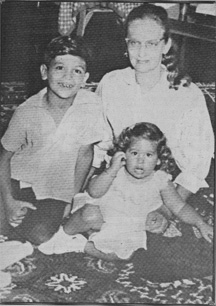From the early calls for adult suffrage for women in the late 1940s to her founding role first in the Women’s Political and Economic Organization and then the Women’s Progressive Organisation (WPO) that led to the championing of issues affecting women such as extended working hours and the freedom to work and raise a family, Mrs Jagan’s contributions are singled out as being of particular significance.
“Her indelible mark on women’s empowerment is part of the country’s history, and those of us who fought along with her understand the impact of her work,” General Secretary of the WPO, Indra Chanderpal said, as she reflected on Mrs Jagan’s contribution to women here and by extension, universally.
Mournful in appearance and sitting at Freedom House a short distance away from the WPO’s office at the Robb Street headquarters of the People’s Progressive Party (PPP) yesterday, Chanderpal said that Mrs Jagan led the women’s struggle through the WPO up until her last days, but noted that her work had started much earlier.
She defined the role Mrs Jagan played as “critical during a particularly difficult time for women,” noting that were many barriers to be crossed in those days. Stating that the early years of the women’s struggle were before her time as an activist, Chanderpal said many of the issues later became clear to her about a decade later when Mrs Jagan began to “passionately press them home.”
She remembers Mrs Jagan as a fierce and passionate woman who was an activist, a mother, a consummate politician, a revolutionary and a keen journalist, who “believed that women had a key role to play in national development and that they must.”
Chanderpal, a protégé of Mrs Jagan, represents an enduring legacy of activism within the women’s arm of the party. She told Stabroek News yesterday that Mrs Jagan was a mother to her, guiding her as she moved up within the ranks and was later appointed a minister of government.

“I and so many others who looked up to her tried to emulate her… she has moulded so many of us and it is our duty to carry on where she has left on and based on what she has taught us,” Chanderpal said.
She said that the strategic decisions of the WPO would often go to Mrs Jagan for advice before being implemented because of her wealth of knowledge and astute approach to issues. It was only recently, Chanderpal said, that Mrs Jagan called on the WPO to take up a more political role and “get women more involved in politics.”
According to her, the WPO has heeded the advice and is moving towards solidifying its role as an organization where women are exposed to political issues and are allowed to participate. She noted that Mrs Jagan had always felt that women should be in the mainstream of politics.
Recalling that she was at Mrs Jagan’s side on Friday night after she had been admitted at the Georgetown Public Hospital, Chanderpal said that a feeling of nervousness overwhelmed her as a sense of a possible loss stepped in. She remembers touching the former President and getting the sense that Mrs Jagan knew that she was there.
At a personal level, Chanderpal said Mrs Jagan’s loss is tremendous since she had started work on a biography of the former president a few years ago, and had not persevered in concluding it.
“I will have to finish it now, I must in her memory,” Chanderpal said.
Further, she said that Mrs Jagan was the only person that she would go to for guidance on political issues.
Chanderpal said her relationship with Mrs Jagan began many years ago, recalling that she had initially started to work as a receptionist/typist at Freedom House back in the 1970s.
‘We shared the
same cell’
Mrs Jagan’s close friend, Philomena Sahoye-Shury struggled to maintain her composure during an interview yesterday on the woman she described as “a mother of this nation and my dear, dear sister and friend.”
Declaring that very few people understood the contributions of Mrs Jagan to Guyana over the past 50 years, she said that Mrs Jagan fought a tireless battle for independence and for the liberation of women, particularly as it related to ordinary, poor women.
“We go years and years back… she was imprisoned and so was I and coincidentally we shared the same jail cell at New Amsterdam, but obviously not at the same time,” she recalled.
She said that Mrs Jagan’s birth origin is of no significance when compared with her contributions to Guyana, adding that the extent of her accomplishments over the years attest to the person that Mrs Jagan was and the goals that she pursued.
She recalled that women worked for 12 hours in many professions and that there were rules in these professions that they could not get married and/or have children, noting that Mrs Jagan fought to change that and did.
According to Sahoye-Shury, Mrs Jagan fought for women in the canefields, women in offices and women at home. She said that when the desire to get involved consumed her, Mrs Jagan was there like a lighting rod and a stalwart leading the fight.
“She was like the captain of the ship,” Sahoye-Shury said, adding that Mrs Jagan’s involvement in trade unionism broke barriers for women in the movement.
“Her death has impacted on me tremendously, I have cried but not enough and will likely cry some more. She has done this country an immense good and we should all be cognizant of that fact,” she added.








